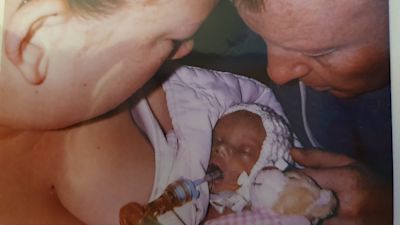'We can only hope these beautiful humans didn’t die in vain': Mother awaits Ockenden Review findings

A long-awaited report into the harm and deaths of more than 1,800 mothers and babies at a Midlands hospital trust is set to be published on Wednesday. Midlands Correspondent Ben Chapman met a mother who lost one baby and feared she could lose her second
It is an incomprehensible number, but for 1,862 families, Wednesday will be both a long-awaited, and distressing day.
Behind the numbers of what will be confirmed as one of the very worst NHS scandals, are the names of babies whose lives were barely lived; mothers who died in childbirth or were left scarred; children growing up with lifelong illnesses.
For their loved ones, the publication of the Ockenden Review offers a chance to learn the truth, both in their own story, and the wider one of how maternity services in Shrewsbury and Telford failed so badly, for so long.
The majority of cases being reviewed happened between 2000 and 2019. But for Steph Hotchkiss, the need for change is based on more recent experiences. A year ago, giving birth to her son Blayke in Telford brought back painful memories.
The death of her baby girl, Sophiya, in 2014, was one of the original cases to be examined by the review.
Steph was left waiting, in pain, for 40 minutes, to be checked over. When she finally was, Sophiya had no heartbeat. Steph had suffered a ruptured placenta, starving her baby of oxygen.
Last February, while pregnant with Blayke, she felt similar symptoms, and again felt like hospital staff weren’t taking her seriously.
“It was like history was going to repeat itself,” she told me. "Genuinely, I thought I was going to have to bury another child because they weren’t listening.
“Change needs to happen and it needs to happen quickly.
“We can only hope that things will change and will make a difference, and all our beautiful little humans didn’t die in vain.”
The review’s interim findings were damning: failures to listen to parents; failures to spot when pregnancies were going wrong and escalate them; an unhealthy obsession with trying to reduce the number of Caesarean sections.
There was a culture where rather than learning from tragic mistakes, mothers were often blamed for the loss of their babies.
A spokesperson for the Shrewsbury and Telford Hospital Trust has apologised for the hurt and distress caused in the past, and says it has “delivered all the actions the Trust were asked to lead following the first Ockenden Report and made strong progress in improving care".
But it accepts it has “much more to do".
There have already been changes in national policy, with trusts being told to abandon targets to limit Caesarean sections. Last week the NHS in England announced a £127 million funding boost for maternity services.
The report’s author, the senior midwife Donna Ockenden, tweeted this week that her report will set out a "blueprint for safe maternity care" across not just Shropshire, but the whole of England.
As well as answers, it is the legacy that she and so many of those 1,862 families are now desperate to achieve for every one of those babies, children and mothers.